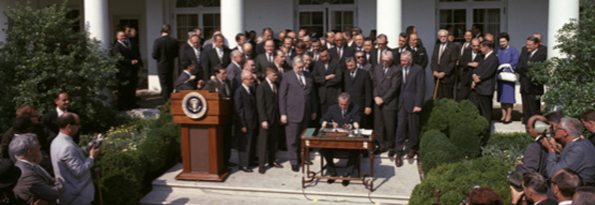History of AEOA

In 1964, President Lyndon Johnson signed the Economic Opportunity Act and, in essence, declared a “war on poverty.” Community officials, service providers, schools, and neighbors came together to plan and implement programs and services to help low-income people and called it “Community Action.”
The Arrowhead Economic Opportunity Agency (AEOA) was incorporated in April, 1965, as a 501(c)(3) non-profit organization and established as a Community Action Program (CAP) for the Northeast Minnesota counties of St. Louis, Lake, and Cook.
The story of AEOA's first 50+ years can be outlined by the following key events which reflect the Agency's growing impact in the Arrowhead region:
2021
- The Agency continued to partner with the USDA as part of the Coronavirus Food Assistance Program to distribute more food across the Arrowhead Region. At program end, AEOA staff and volunteers distributed a grand total of 2,130,906 pounds of fresh and frozen food to families in need.
- AEOA develops TechConnect program to offer a financial aid opportunity for individuals to purchase refurbished desktop computers and internet hotspots with one year of pre-paid service for $20 per device.
- The Agency distributed 363 pairs of brand-new shoes, 1,550 pairs of socks, and 277 healthy snack bags, to children in need before the 2021 school year.
- Arrowhead Transit expanded to Chisago and Isanti Counties.
- The Aurora Food Shelf (AFS) relocated to another building in Aurora. With the assistance of AEOA, AFS purchased a building in Aurora. AEOA assisted with securing funding for various required building renovations to accommodate the new use.
- AEOA was established as a Community Resource Hub as part of the Northeastern Minnesota Community Implementation Hub Collaborative pilot project through partnership with the Northland Foundation. Pregnant individuals and families with young children (birth-8 years old) receive navigation services to get connected to resources to help their family thrive.
2020
- AEOA partnered with the USDA as part of the Coronavirus Food Assistance Program to ensure people in the Arrowhead region had access to had access to food during the COVID-19 pandemic. Over several months, AEOA staff and volunteers distributed over 1,354,737 million pounds (62,655 boxes) of fresh and frozen food to families in need through these free food distribution events.
- AEOA begins rebranding process by redesigning the Agency logo and creating a new website.
2019
- The Quad City Food Shelf (QCFS) relocated from Gilbert to 8367 Enterprise Drive N. in Mt. Iron. With the assistance of AEOA, QCFS purchased and renovated a 6,000 square foot building in Mt. Iron that officially opened the doors on Oct 23, 2019.
- The Rutabaga Project planted a Community Food Forest near Pine Mill Court in Virginia that contains 24 fruit and nut trees, many berry bushes, and some raised bed planters with annual plants. Community volunteers maintain the food forest and the site is accessible for anyone to harvest.
2018
- Community Care Auto Repair officially opened to the public
- Ivy Manor was completed. An Open House, ribbon cutting, and luncheon was held to commemorate the event.
2017
- Expanded EBT services to the Cook Farmers Market.
- Started Community Care Auto Repair, a social enterprise endeavor where the market supports the mission of providing affordable car repair services to struggling community members.
- Arrowhead Transit leased a garage in Hermantown for its new Hermantown Dial-A-Ride service.
- YouthBuild Youth at Work Equity serving Native American youth on the Bois Forte Reservation in Nett Lake. Nineteen (19) youth were involved in renovation and remodeling of tribal housing units.
- The Dislocated Worker Project aids those who lost their jobs with Jarden’s Inc. in Cloquet, MN when the facility closed.
2016
- Begins to offer EBT services at the Hibbing and Virginia Farmers Markets
- Historic Ivy Manor is purchased with plans to rehabilitate and preserve 41 units of housing in the City of Virginia
- The Dislocated Worker Project aids those who lost their jobs with Mesabi Academy when the facility closed in Buhl, MN.
2015
- Partnered with Iron Range Partnership for Sustainability and launched the Rutabaga Project; providing healthy, local food to low-income neighborhoods.
- Elder Services Network dissolves and transitions the Grocery-to-Go service, the medical equipment loan closet, and provider network to Senior Services.
2014
- AEOA and KOOTASCA Community Action entered into a unique partnership for shared service direct and administrative services. AEOA was given a Promising Practice award from MinnCap for this partnership.
- Arrowhead Transit leased a garage in Sandstone for its Pine County buses.
2013
- The Northern Lights Association dissolves and transitions the Senior Partners Care Program to Senior Services.
- AEOA received an enrollment grant through MNsure and began a partnership with three other community action agencies to form a coalition to assist consumers with applying for medical assistance and Minnesota Care.
- Arrowhead Transit built an addition on to their building in Gilbert to provide a custom designed office space for dispatchers.
2012
- Senior Services receives SNAP outreach funds to provide outreach and application assistance to seniors and other eligible people in St. Louis County.
- AEOA partners with the Iron Range Resources and Rehabilitation Board to create the Business Energy Retrofit Program which provides funding to rehabilitate businesses in the Taconite Assistance Area.
- Expansion of Transitional Housing for AEOA Youth Service in Koochiching and Itasca Counties funded by the Bremer Foundation and OEO – RHYA.
- Arrowhead Transit received a grant from Blandin and was able to rebrand its busses and logo.
2011
- AEOA hired more than 50 employees to help with the demand of the expanding Weatherization Program. Eighty percent (80%) of those hired had been unemployed prior.
- Arrowhead Transit added Pine County to its service area.
2010
- Early Head Start was awarded funding through American Recovery and Reinvestment Act and added an additional 32 families.
2009
- Senior Services expands Senior Dining/Meals on Wheels to Duluth.
- Virginia Youth Foyer ground-breaking and site development commenced.
- The American Recovery and Reinvestment Act (ARRA) provides $132 million dollars to the State of Minnesota for the Weatherization Assistance Program; the largest increase in funding in the history of the program.
- Land is purchased, and the construction begins on the Youth Foyer, creating 15 new units of housing in the City of Virginia.
2008
- The Rural Rides project is developed by Transit to address the most frequently mentioned and challenging barrier to employment: reliable transportation. Arrowhead Transit's International Falls Facility was built.
2007
- AEOA completes a community assessment that is essentially the “voice of the people."
2006
- Head Start’s “Carries Away” program helps pregnant women and children ages birth to 3 years receive oral health services.
- Arrowhead Transit acquired Cloquet Dial-a-Ride operations.
2005
- AEOA celebrates 40 years in action.
- The AEOA Foundation is created to strengthen our financial security for the long-term.
2004
- Senior Services expands the Retired Senior Volunteer Program (RSVP) to Duluth.
- Senior Services launches the rural Bundled Delivery service model in Aitkin County; a collaborative partnership with private and human service agencies that “bundles” several services – prepared meals, grocery delivery and medication pick-up – and delivers the “bundle to the homes of homebound seniors in rural and remote areas.
2003
- Head Start was awarded a Federal Early Head Start grant to serve an additional 50 pregnant women, infants, and toddlers.
2002
- AEOA completes a new facility in Two Harbors for the Transit, Adult Basic Education, Head Start, and Housing programs.
2001
- The new Human Resources department aids in selection, retention and training of staff.
2000
- Head Start reopens in Virginia and begins providing in-home counseling services.
- Senior Services expands Senior Dining/Meals on Wheels to Itasca and Koochiching Counties
1999
- A comprehensive Community Needs Assessment of 595 low-income households helps analyze the concerns of low-income households in our area.
1998
- Employment and Training and Transit help public assistance MFIP recipients’ transition from welfare-to-work.
1997
- YouthBuild collaborates with Housing to renovate a single-room occupancy apartment complex for homeless individuals.
1996
- Housing Services begins operation of a homeless shelter in the city of Virginia.
1995
- Senior Services begins the ROCK program (Raising Our Children’s Kids) to offer support for grandparents who are the primary caregiver of their grandchildren.
1994
- Welfare reform is on the top of most legislative agendas, with changes occurring in welfare-to-work strategies.
- Arrowhead Transit's Grand Rapids facility was built.
1993
- The Agency puts considerable effort into a community needs assessment survey to analyze the needs of low-income residents.
1992
- An updated Agency mission statement is developed and adopted by the Board.
1991
- The Agency acquires a main frame computer to centralize information technology.
1990
- AEOA's celebrates 25 years in action.
- Grand opening of Arrowhead Transit's new headquarters.
1989
- Construction begins on Arrowhead Transit's new regional headquarters in Gilbert.
1988
- AEOA partners with Twin Cities agencies to help the unemployed find fulltime jobs, housing, and financial assistance to relocate to the metropolitan area.
1987
- AEOA helps develop the American Indian Employment Program in conjunction with the Minnesota Chippewa Tribe.
1986
- AEOA launches the Hospitality Host Program, combining the region's talented older workers and the growing tourism industry.
1985
- Arrowhead Transit receives national recognition when nominated as the Outstanding Rural Transportation System of the Year.
1983
- AEOA develops the Apple Tree Learning Center childcare facility
- AEOA opens a network of Food Shelves.
1982
- Agency economic development activities incorporate into the Arrowhead Community Economic Assistance Corporation (ACEAC).
1981
- AEOA implements the Adult Basic/Continuing Education Program which helps adults improve skills in basic education, daily living, and employability.
- Senior Services held the first ever All-County Senior Picnic.
1980
- Congress enacts Low-Income Home Energy Assistance allowing AEOA to serve a greater number of area residents.
1979
- Transit ridership doubles and continues to grow until Arrowhead Transit is now the largest rural public transportation system in the nation.
1978
- AEOA, as a Title I lender, expands its housing rehabilitation programs.
1977
- In further response to the energy crisis, AEOA provides emergency fuel cost assistance to the elderly and low-income individuals.
1976
- AEOA begins offering home rehabilitation programs to low-income homeowners.
1975
- The "Energy Crisis" prompts a new Fuel and Energy Program.
1974
- AEOA delivers Comprehensive Employment and Training Act (CETA) programs for low income individuals.
1973
- The Elderly Nutrition Project helps seniors live independently in their own homes.
1972
- The first Retired Senior Volunteer Program (RSVP) in the state of Minnesota begins.
1971
- AEOA establishes the Arrowhead Community Economic Assistance Corporation.
1970
- The Mayor's Conference on Aging is the beginning of an effort to establish programs for senior citizens.
1969
- Recognizing the need for chemical dependency treatment on the Iron Range, AEOA starts the Arrowhead Center for Problem Drinking, which later becomes a separate organization.
1968
- AEOA collaborates with the Range Bar Association and area judges to generate support for a free legal aid program for low-income people.
1967
- Rural youth improve academic skills while enjoying Camp Buckskin near Ely.
1966
- In further response to the energy crisis, AEOA provides emergency fuel cost assistance to the elderly and low-income individuals.
1965
- AEOA is established!



